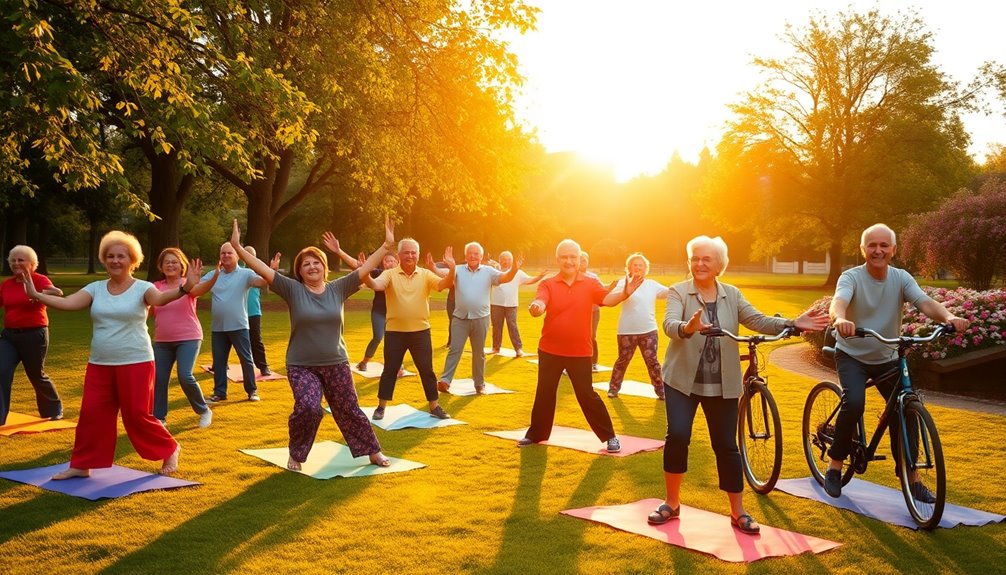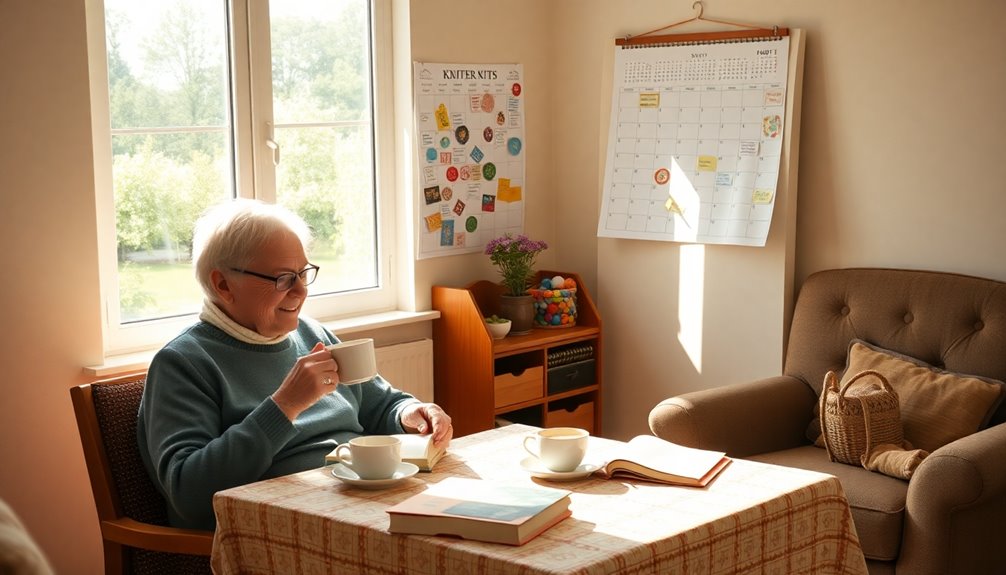You won't believe how simple changes can boost mental health for the elderly! Engage in regular physical activity to lift your mood, and foster social connections by joining community groups. Explore creative outlets like painting or writing, and practice mindfulness techniques for peace of mind. Maintain a structured routine to reduce stress and prioritize quality sleep for better emotional regulation. Stay informed about nutritional health and don't hesitate to seek professional support when needed. There's so much more to discover!
Key Takeaways
- Engage in at least 150 minutes of moderate aerobic exercise weekly to boost resilience against mental health issues and improve overall well-being.
- Foster social connections by participating in community activities to combat loneliness and promote meaningful relationships.
- Explore creative outlets like painting or writing to enhance emotional well-being and reduce anxiety through a sense of accomplishment.
- Establish a consistent bedtime routine to improve sleep quality, which is crucial for mental health and emotional regulation.
- Seek professional support through therapy, which can significantly reduce symptoms of depression and anxiety, promoting overall emotional well-being.
Engage in Regular Physical Activity

Engaging in regular physical activity is essential for maintaining your mental health as you age.
Regular exercise, like walking, swimming, or yoga, can reduce the odds of depression and greatly enhance your overall well-being. Aim for at least 150 minutes of moderate aerobic exercise each week; this level of activity boosts your resilience against mental health issues. In addition, activities like hula hooping can also provide a fun way to stay active while improving cardiovascular fitness. Furthermore, maintaining a consistent bedtime routine can enhance sleep quality, which is crucial for mental health.
As you exercise, your body improves its ability to handle stress, which is vital during life changes. Plus, staying physically fit can enhance cognitive function and help combat memory decline. Incorporating whole foods into your diet alongside regular exercise can further support mental well-being.
Foster Social Connections

Staying active is just one piece of the puzzle for maintaining mental health as you age. Equally important are social connections.
Loneliness can greatly increase your risk of depression and anxiety. To combat this, engage in community activities or join groups where you can meet new friends and reduce feelings of isolation. Additionally, consider the financial implications of assisted living expenses when planning for your future, as these arrangements can facilitate social interactions and community engagement. Regular social interactions also help mitigate the effects of narcissistic abuse, which can lead to emotional distress and hinder relationship-building.
Studies show that regular social interactions can lower your risk of mortality by up to 50%. Encourage family visits and keep in touch through phone calls or video chats to foster a sense of belonging. Additionally, participating in community support programs, such as foster care systems, can help create meaningful relationships and provide a sense of purpose.
These interactions provide essential emotional support and enhance your overall well-being. Remember, building and maintaining social connections can make a world of difference in your mental health as you grow older.
Explore Creative Outlets

There's something truly uplifting about exploring creative outlets as you age. Engaging in activities like painting, writing, or crafting can greatly boost your mental well-being. These artistic pursuits give you a sense of accomplishment, helping to reduce feelings of depression and anxiety while fostering a positive mood. As you express yourself creatively, you'll not only explore your thoughts and emotions but also enhance your self-awareness.
Participating in group art therapy sessions can further combat loneliness, promoting social interaction and connection with others. Plus, regular engagement in creative activities stimulates cognitive functions, improving memory and problem-solving skills. Additionally, establishing a bedtime routine can be beneficial for maintaining a consistent schedule that fosters mental clarity and emotional balance.
Practice Mindfulness Techniques

Practicing mindfulness techniques can bring a wealth of benefits to your mental health. Simple exercises, like deep breathing or short meditations, can easily fit into your daily routine. Additionally, incorporating certain teas like green tea may further enhance your cognitive function and support relaxation.
Benefits of Mindfulness Practice
Although aging can bring various challenges, incorporating mindfulness practices into your daily routine can greatly enhance your mental well-being. Engaging in mindfulness helps reduce symptoms of anxiety and depression, promoting overall mental health. Additionally, regular practice of mindfulness fosters a greater appreciation for the present moment.
Regular mindfulness exercises improve cognitive function and sharpen your focus, which is especially beneficial if you're experiencing memory decline. Furthermore, these practices can help cultivate a sense of spiritual energy that supports emotional resilience. Additionally, mindfulness enhances your emotional regulation, helping you manage stress and navigate difficult situations more effectively. Techniques like deep breathing and body scans not only support mental wellness but can also lower blood pressure, positively impacting your physical health. Furthermore, mindfulness practices align with the importance of relaxation before sleep, which can enhance your overall manifestations and well-being.
Embrace mindfulness for a healthier, happier you!
Simple Mindfulness Exercises
To cultivate mindfulness in your daily life, try incorporating simple exercises that can easily fit into your routine.
Start with deep breathing; take a few moments to focus on your breath, inhaling deeply and exhaling slowly. This mindfulness exercise can greatly reduce anxiety and promote calm. Many people find that establishing a consistent routine helps them stay committed to these practices. Additionally, practicing mindfulness enhances emotional resilience, allowing individuals to better cope with daily stressors.
You can also practice mindful walking, paying attention to each step and the sensations around you, enhancing both mood and physical health.
Consider gratitude journaling, where you jot down things you're thankful for each day; this boosts emotional resilience.
Another effective technique is guided imagery—imagine peaceful scenes to reduce stress and improve sleep.
Just a few minutes of these mindfulness exercises daily can enhance cognitive function and memory retention, benefiting your mental health immensely. Incorporating stress management techniques into your routine can further enhance the effectiveness of these mindfulness practices.
Incorporating Mindfulness Daily
Incorporating mindfulness into your daily routine can be transformative, especially as you navigate the challenges of aging. Practicing mindfulness techniques like deep breathing and body scans can greatly reduce symptoms of anxiety and depression, enhancing your overall mental well-being.
Try engaging in mindfulness meditation for just 10 minutes each day; it can improve your focus and emotional regulation, which is vital as cognitive decline occurs. Additionally, mindful walking or eating helps you stay present, leading to greater satisfaction in daily activities. Quality sleep enhances creativity and problem-solving skills, which can further support your mindfulness practice.
Regular mindfulness practice can even lower blood pressure and improve heart health, addressing physical conditions that may impact your mental health. Plus, joining group mindfulness activities fosters social connections, helping combat loneliness and enriching your life. Furthermore, emotional regulation is essential for managing responses to stressors, enabling a more resilient mindset during the aging process.
Maintain a Structured Routine

When you maintain a structured routine, you create a sense of predictability that can greatly boost your mental health.
Establishing consistent daily activities helps regulate your sleep patterns, which is essential for overall well-being and can combat insomnia. A well-defined schedule encourages you to engage in social and physical activities, helping to reduce feelings of loneliness and depression.
Research shows that sticking to a routine can also improve cognitive function by keeping your mind active and reducing the risk of cognitive decline.
Plus, a structured routine supports better management of chronic health conditions, making it easier to adhere to medication schedules and healthy lifestyle choices.
Embrace a daily routine to enhance your mental wellness!
Incorporate Journaling as a Therapeutic Outlet

Journaling can be a powerful way for you to express your emotions and relieve stress.
It not only enhances your memory and encourages reflection but also fosters mindfulness in your daily life.
Emotional Expression Through Writing
While many might overlook the power of writing, it can serve as an essential therapeutic outlet for emotional expression among the elderly. Journaling offers a safe space to express thoughts and feelings, which can greatly reduce depression and anxiety.
By regularly writing about life changes—like loss or retirement—you can foster resilience and gain emotional clarity. Research shows that those who engage in expressive writing report higher levels of happiness and life satisfaction, highlighting the importance of emotional expression through writing.
Plus, journaling enhances cognitive function, promoting reflection and self-awareness. So, grab a pen and start capturing your thoughts; it's a simple yet impactful way to boost your mental health and well-being.
Memory Enhancement and Reflection
Reflecting on memories can be a powerful way to enhance cognitive function and emotional well-being in older adults.
Journaling serves as a therapeutic outlet that improves memory retention while allowing you to articulate your thoughts and feelings effectively. By writing about daily events and emotions, you not only boost clarity but also reduce anxiety and depression symptoms, contributing to overall mental health.
This personalized narrative helps you make sense of your life story, fostering a sense of identity and continuity. Engaging in regular journaling encourages you to stay present, connecting you with your surroundings and enhancing your reflective practice.
Stress Relief and Mindfulness
Engaging in stress relief practices can greatly enhance your mental well-being, and journaling serves as an effective tool to achieve this. By regularly putting pen to paper, you create a safe space to express your thoughts and emotions, which can considerably reduce anxiety and stress levels.
Journaling also promotes mindfulness; focusing on the present moment helps minimize rumination and fosters a balanced emotional state. Writing about positive experiences boosts your feelings of well-being and can lessen symptoms of depression.
Additionally, this practice can enhance cognitive function, supporting healthy aging by improving memory and comprehension. Embrace journaling as a therapeutic outlet, and you'll likely discover greater psychological resilience and lower health-related stress in your life.
Prioritize Quality Sleep

To guarantee better mental health in your later years, prioritizing quality sleep is crucial. Poor sleep can worsen anxiety and depression, trapping you in a cycle that harms your quality of life.
By maintaining regular sleep patterns, you can boost cognitive function and emotional regulation.
Here are some tips to enhance your sleep quality:
- Create a calming bedtime routine.
- Make sure your sleep environment is comfortable and dark.
- Address sleep issues like insomnia or sleep apnea.
- Stay consistent with your sleep schedule.
Improving your sleep can elevate your mood and resilience to stress, making it a critical aspect of mental health care for older adults.
Don't underestimate the power of a good night's sleep!
Stay Informed About Nutritional Health

Staying informed about nutritional health is vital for your mental well-being.
A balanced diet filled with fruits, vegetables, and lean proteins can enhance your mood and resilience.
Plus, ensuring you get enough essential nutrients can help prevent anxiety and depression as you age.
Nutrient Intake Importance
Adequate nutrient intake plays an essential role in maintaining mental health for the elderly. When you guarantee your diet is rich in crucial nutrients, you can markedly reduce the risk of depression and anxiety.
Consider the following key points about nutrient intake importance:
- Vitamin D deficiency can lead to mood disorders and affects bone health.
- Incorporating omega-3 fatty acids from fish can improve cognitive function.
- A diet full of fruits, vegetables, and whole grains enhances overall well-being.
- Staying hydrated boosts mood stability and cognitive health.
Balanced Diet Benefits
While you may not realize it, maintaining a balanced diet can greatly enhance your mental health as you age. A diet rich in fruits, vegetables, whole grains, and lean proteins provides essential nutrients that support cognitive function and emotional well-being.
For instance, omega-3 fatty acids found in fatty fish and flaxseeds can reduce depression symptoms and improve brain health. Additionally, ensuring adequate vitamin D through your diet or supplements helps combat depression and supports bone health.
Staying hydrated is important too; drinking enough water daily aids mental clarity and mood regulation. By embracing these balanced diet benefits, you'll not only feel healthier but also boost your overall mental health, making aging a much more enjoyable experience.
Seek Out Professional Support When Needed

When you find yourself struggling with feelings of sadness or anxiety, seeking professional support can be an essential step towards better mental health. Many older adults hesitate to ask for help, but reaching out can enhance your emotional well-being and resilience.
Professional support offers tailored coping strategies that address unique challenges like grief, loneliness, or chronic illness. Plus, regular check-ins with healthcare providers help identify issues early, ensuring you get the care you need.
- Therapy can reduce symptoms of depression and anxiety by about 50%.
- Telehealth services make support accessible from home.
- Professional support fosters a safe space for sharing feelings.
- Overcoming stigma can lead to improved mental health outcomes.
Embrace the Benefits of Nature and Outdoors

Embracing the outdoors can greatly enhance your mental health, especially as you age. Spending time in nature reduces anxiety and depression, boosting your overall well-being.
Engaging in physical activity, like walking or gardening, not only keeps you fit but also lowers cortisol levels, helping to alleviate stress and improve your mood. Even a short 15-minute walk in a park can considerably lift your spirits and reduce loneliness.
Plus, connecting with nature fosters social interactions, which are essential in combating isolation. So, get outside, breathe in the fresh air, and soak up the sun.
You'll find that nature offers an invigorating escape, enhancing both your mental and physical health along the way.
Frequently Asked Questions
What Is the Most Common Mental Health Problem for Older Adults?
The most common mental health problem for older adults is depression.
You might notice that about 1 in 5 seniors experience symptoms of depression, often linked to factors like social isolation, loss, or chronic illness.
If you or someone you know is struggling, it's crucial to seek help.
Early intervention can make a significant difference, allowing older adults to lead happier, more fulfilling lives while managing their mental health effectively.
What Is the Most Effective Mental Health Treatment?
Imagine your mental health as a garden; it thrives when nurtured with the right tools. The most effective treatment combines psychotherapy, medication, and lifestyle changes tailored just for you.
Cognitive Behavioral Therapy (CBT) can help reshape your thoughts, while SSRIs might lift your mood.
Don't forget about regular exercise and social connections—they're essential for reducing anxiety and depression.
What Are the 5 C's of Mental Health?
The 5 C's of mental health are Connection, Coping, Contribution, Creativity, and Control.
You need to nurture your social relationships to combat loneliness, which is essential for emotional well-being.
Develop healthy coping strategies like mindfulness and exercise to manage stress effectively.
Stay active through volunteering to enhance your sense of purpose.
Embrace creativity by expressing yourself through art or writing, as it stimulates your mind and helps process your feelings.
How to Improve Mental Health for the Elderly?
Improving mental health for the elderly isn't just a nice thought; it's a lifeline.
You can start by engaging in regular physical activity to lift your spirits and reduce stress.
Prioritize sensory health to keep your world vibrant, and guarantee you're getting quality sleep to break that exhausting cycle of anxiety.
Cultivate social connections, as they're essential to stave off loneliness, and nourish your body with a balanced diet to support your overall well-being.
Conclusion
By incorporating these mental health hacks, you can greatly enhance your well-being. Did you know that seniors who engage in regular social activities cut their risk of depression by 50%? That's a powerful reminder of the importance of connection and community! So, get moving, stay connected, and embrace creativity. Remember, taking small steps can lead to big changes in your mental health. You've got the tools—now it's time to put them into action!









